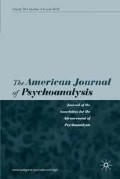Abstract
The ultra-orthodox Jewish (Haredi) community in Israel is characterized by strict observance of the requirements of orthodox Jewish life. Psychoanalytic psychotherapy within this community brings us into contact with guilt as a central emotion throughout the therapeutic process. The exposure to new concepts, ways of thought and a previously unknown space, together with increased awareness of internal wishes and drives, are experienced as forbidden areas that arouse an awakening of conscience and a sense of guilt. The author’s cases illustrate these conflicts.
Similar content being viewed by others
References
Bion, W. (1959). Attacks on linking. International Journal of Psychoanalysis, 40, 308–315.
Bion, W. (1962). Learning from experience. London: William Heineman Medical Books.
Bion, W. (1967). Notes of memory and desire. The Psychoanalytic Forum, 2 (3), 272–273, 279–280. Los Angeles, CA: Psychiatric Research Foundation.
Bollas, C. (1987). The shadow of the object. London: Free Association Books Ltd [Hebrew-language edition, Tel Aviv, Dvir Publishers, 2000].
Buber, M. (1957). Guilt and guilt feelings. Psychiatry, 20 (2), 114–129.
Buber, M. (1965). The image of man: Studies in philosophical anthropology (philosophical writings, Vol 2) Hebrew-language edition Jerusalem: The Bialik Institute 1965 (second edition).
Cohen, M. & Gereboff, J. (2004). Orthodox Judaism and psychoanalysis: Toward dialogue and reconciliation. Journal of the American Academy of Psychoanalysis, 32 (2), 267–286.
Coltart, N. (1992). The super-ego, anxiety and guilt. Free Associations, 3 (2), 243–259.
Freud, S. (1907). Obsessive actions and religious practice. Standard Edition (Vol. 9, pp. 115–128). London: Hogarth.
Freud, S. (1923). The ego and the id. Standard Edition (Vol. 19, pp. 3–68). London: Hogarth.
Greenberg, D. & Witztum, E. (2001). Sanity and sanctity: Mental health work among the ultra-orthodox in Jerusalem. New Haven, CT: Yale University Press.
Hansel, J. (2007). Levinas in Jerusalem. Psychological interpretation and religious perspective. Jerusalem: Magnes Press.
Hess, E. (2007). Being a Haredi patient. In Issues in psychology, psychotherapy and Judaism (pp. 105–121). Jerusalem: Nefesh Israel Publication.
Hess, E. (2011a). On the knowing. http://www.psygroups.com/iapp/.
Hess, E. (2011b). Psychoanalytical psychotherapy in the ultra-orthodox community: Contradiction, Conflict or possible tension. Ph.D. Thesis, Alexandru Ioan Cuza University, Iasi, Romania.
Kant, I. (1781). Critique of pure reason. Translated into Hebrew by Yovel, Yirmiyahu. Sifriyat Hapoalim Hakibbutz Hameuhad 2013.
Klein, M. (1933). The early development of conscience in the child. In R. E. Money-Kyrle (Ed.), Love, guilt and reparation and other works 1921–1945 (Vol. I, pp. 248–257). New York: Free Press 1975.
Klein, M. (1937). Love, guilt and reparation. In R. E. Money-Kyrle (Ed.), Love, guilt and reparation and other works 1921–1945 (Vol. I, pp. 306–343). New York: Free Press 1975.
Klein, M. (1946). Notes on some schizoid mechanisms. International Journal of Psychoanalysis, 27 (3), 99–109.
Klein, M. (1957). Envy and gratitude. In R. E. Money-Kyrle (Ed.), Envy and gratitude and other works 1946–1963 (Vol. III, pp. 176–235). New York: Free Press 1975.
Laplanche, J. & Pontalis, J.-B. (1973). The language of psychoanalysis. D. Nicholson-Smith (Trans.). New York: W. W. Norton.
Levinas, E. (1985). Ethics and infinity: conversations with Philippe Nemo. Pittsburgh, PA: Duquesne University Press.
Levinas, E. (2010). Totality and infinity: An essay on exteriority. Jerusalem: Magnes Press.
Levy, Z. (1997). Otherness and responsibility: A study of Emmanuel Levinas’ philosophy. Jerusalem: Magnes Press.
Meissner, W. W. (1996). The pathology of beliefs and the beliefs of pathology. In E. P. Shafranske (Ed.), Religion and the clinical practice of psychology (pp. 241–267). Washington, DC: American Psychological Association.
Mitchell, S. A. (2000). You’ve got to suffer if you want to sing the blues: Psychoanalytic reflections on guilt and self pity. Psychoanalytic Dialogues, 10 (5), 713–773.
Ogden, T. H. (1989). The primitive edge of experience. Tel Aviv: Am Oved [Hebrew-language version].
Sandler, P. C. (2005). A dictionary of concepts. London: Karnac Books.
Spero, M. H. (1981). Countertransference in religious therapists of religious patients. American Journal of Psychotherapy, 35 (4), 565–575.
Stolorow, R. D. (2011). Toward greater authenticity: From shame to existential guilt, anxiety, and grief. International Journal of Psychoanalytic Self Psychology, 6 (2), 285–287.
Winnicott, D. W. (1958). Psychoanalysis and the sense of guilt. In J. D. Sutherland (Ed.) Psychoanalysis and contemporary thought. London: Maresfield Library.
Winnicott, D. W. (1971). Playing and reality. London: Penguin Books.
Biblical references
All quotations from the Bible are from the New King James Version.
“Scripture taken from the New King James Version®. Copyright © 1982 by Thomas Nelson, Inc. Used by permission. All rights reserved”.
Genesis, Exodus, Leviticus, Deuteronomy, Ecclesiastes, Proverbs and Psalms.
Author information
Authors and Affiliations
Additional information
This paper describes material that is part of a larger research project entitled “Psychoanalytical Psychotherapy in the Ultra-Orthodox Community: Contradiction, Conflict or Possible Tension” (Hess, 2011b).
1Esther Hess, Ph.D., is affiliated with Mayanei HaYeshua Medical Center, 15 Rav Povarsky Street, Bnei Brak 51544 Israel; Jerusalem College, P.O.B. 16078, Bayit Vegan, Jerusalem 91160, Israel; and ASA, Academic Institute of Society and the Arts (Lesley University – Israel Extension), 10 Haorazim St., Netanya 42379, Israel.
Rights and permissions
About this article
Cite this article
Hess, E. The Centrality of Guilt: Working with Ultra-Orthodox Jewish Patients in Israel. Am J Psychoanal 74, 262–279 (2014). https://doi.org/10.1057/ajp.2014.23
Published:
Issue Date:
DOI: https://doi.org/10.1057/ajp.2014.23


